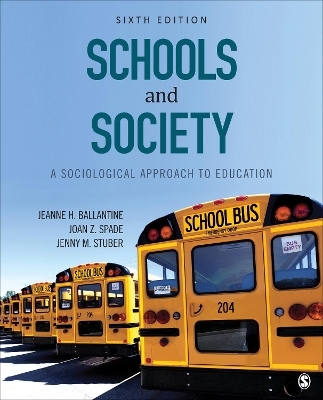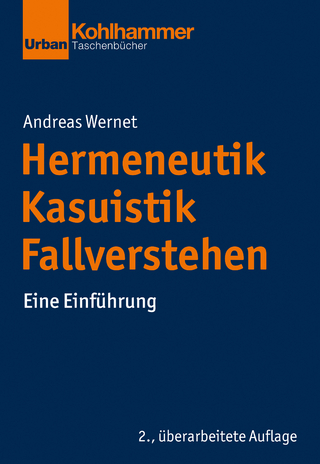
Schools and Society
SAGE Publications Inc (Verlag)
978-1-5063-4697-7 (ISBN)
- Titel ist leider vergriffen;
keine Neuauflage - Artikel merken
This comprehensive anthology features classical readings on the sociology of education, as well as current, original essays by notable contemporary scholars. Assigned as a main text or a supplement, this fully updated Sixth Edition uses the open systems approach to provide readers with a framework for understanding and analyzing the book’s range of topics. Jeanne H. Ballantine, Joan Z. Spade, and new co-editor Jenny M. Stuber, all experienced researchers and instructors in this subject, have chosen articles that are highly readable, and that represent the field’s major theoretical perspectives, methods, and issues.
The Sixth Edition includes twenty new selections and five revisions of original readings and features new perspectives on some of the most contested issues in the field today, such as school funding, gender issues in schools, parent and neighborhood influences on learning, growing inequality in schools, and charter schools.
Jeanne H. Ballantine is Emerita Professor of Sociology at Wright State University, a state university of about 17,000 students in Ohio. She has also taught at several 4-year colleges, including an “alternative” college and a traditionally Black college, and at international programs in universities abroad. She has been teaching introductory sociology for more than 30 years with a mission to introduce the uninitiated to the field and to help students see the usefulness and value in sociology. She has been active in the teaching movement, shaping curriculum, writing and presenting research on teaching, and offering workshops and consulting in regional, national, and international forums. She is a Fulbright Senior Scholar and serves as a Departmental Resources Group consultant and evaluator. Jeanne has written several textbooks, all with the goal of reaching the student audience. As the original director of the Center for Teaching and Learning at Wright State University, she scoured the literature on student learning and served as a mentor to teachers in a wide variety of disciplines. Local, regional, and national organizations have honored her for her teaching and for her contributions to helping others become effective teachers. In 1986, the American Sociological Association’s Section on Undergraduate Education (now called the Section on Teaching and Learning in Sociology) recognized her with the Hans O. Mauksch Award for Distinguished Contributions to Teaching of Sociology. In 2004, she was honored by the American Sociological Association with its Distinguished Contributions to Teaching Award. In 2010, the North Central Sociological Association awarded her the J. Milton Yinger Award for Distinguished Career in Sociology. Joan Z. Spade is Professor Emerita of sociology at The College at Brockport, State University of New York. She received her PhD from the University at Buffalo, State University of New York; her MA from the University of Rochester; and her BA from the State University of New York at Geneseo. In addition to courses on gender, Joan taught courses on education, family, research methods, and statistics. She published articles on rape culture in college fraternities and on work and family, including women’s and men’s orientations toward work. She has also coedited two books on education and published articles on education, including research on tracking, and gender and education. Joan was active in Sociologists for Women in Society, Eastern Sociological Society, and the American Sociological Association. In addition to visiting children and grandchildren with her significant other, she enjoys RVing, music and the arts, travel, and being outdoors. Jenny Stuber is an Associate Professor of Sociology at the University of North Florida. Her research focuses on social class inequality, especially in terms of how people understand and enact it within institutional settings. Her book Inside the College Gates: How Class and Culture Matter in Higher Education (Lexington) explores the reproduction of class inequalities that takes place within higher education’s social and extra-curricular domains. Currently she is working on an ethnographic project in Aspen, Colorado, examining how middle-class residents respond to and resist the growing class inequality within their community. In addition to two textbooks—Exploring Inequality (Oxford University Press) and The Sociology of Education (Routledge), the latter co-authored with Jeanne Ballantine and Floyd Hammock—her research has also appeared in numerous academic journals. A dedicated instructor, her teaching focuses on social inequality, research methods, and annual study abroad trips to Iceland.
Chapter 1: What Is Sociology of Education? Theoretical Perspectives
Reading 1. Sociology of Education: A Unique Perspective for Understanding Schools - Jeanne H. Ballantine and Flloyd M. Hammack
Reading 2. Getting Started: Understanding Education Through Sociological Theory - Jeanne H. Ballantine and Joan
Reading 3. Moral Education - Emily Durkheim
Reading 4. Conflict Theory of Educational Stratification - Randall Collins
Reading 5. Social Reproduction - David Swartz
Reading 6. On Understanding the Process of Schooling: The Contributions of Labeling Theory - Ray C. Rist
Chapter 2: Studying Schools: Research Methods in Education
Reading 7. Chilly Classrooms for Female Undergraduate Students: A Question of Method? - Elizabeth J. Allan and Mary Madden
Reading 8. Small Class Size and Its Effects - Bruce J. Biddle and David C. Berliner
Reading 9. How to Avoid Statistical Traps - Gerald W. Bracey
Chapter 3: Schooling in a Social Context: Educational Environments
Reading 10. The Structure of Educational Organizations - John. W. Meyer and Brian Rowan
Reading 11. A Broader and Bolder Approach Uses Education to Break the Cycle of Poverty - Pedro A. Noguera
Reading 12. Good Schools, Rich Schools; Bad Schools, Poor Schools: Why America′s Public Schools are so Unequal - Alana Semuels
Reading 13. Coached for the Classroom: Parents′ Cultural Transmission and Children′s Reproduction of Educational Inequalities - Jessica McCrory Calarco
Chapter 4: Schools as Organizations: Formal and Informal Education
Reading 14. How Schools Work - Rebecca Barra and Robert Dreeben
Reading 15. Learning the Student Role: Kindergarten as Academic Boot Camp - Harry L. Gracey
Reading 16. Becoming a Gendered Body: Practices of Preschools - Karin A. Martin
Reading 17. "Why Can′t We Learn About This?": Sexual Minority Students Navigate the Official and Hidden Curricular Spaces of High School - Ingrid E. Castro and Mark Conor Sujak
Reading 18. Academic Learning + Socioemotional Learning=National Priority - Roger P. Weissberg and Jason Cascarino
Chapter 5: Roles and Responsibilities: Administrators, Teachers, and Students
Reading 19. School Boards: Why American Education Needs Them - Anne L. Bryant
Reading 20. School Principal: Complications and Complexities - Dan C. Lortie
Reading 21. The Status of Teaching as a Profession - Richard M. Ingersoll and Gregory Collins
Reading 22. Perils and Promises: Middle-Class Parental Involvement in Urban Schools - Maria Bloomfield Cucchiara and Erin McNamara Horvat
Reading 23. Make Students Part of the Solution, Not the Problem - Trevor Gardner
Chapter 6: What We Teach in Schools: Knowledge for What and for Whom?
Reading 24. Monuments Between Covers: The Politics of Textbooks - David Tyack
Reading 25. The Changing Face of War in Textbooks: Depictions of World War II and Vietnam, 1970-2009 - Richard Lachmann and Lacy Mitchell
Reading 26. Facts or Critical Thinking Skills? What NAEP Results Say - Harold Wenglinsky
Chapter 7: Who Gets Ahead? Race, Class, and Gender in Education
Reading 27. Growing Income Inequality Threatens American Education - Greg J. Duncan and Richard J. Murnane
Reading 28. The Rules of the Game and the Uncertain Transmission of Advantage: Middle-class Parents′ Search for an Urban Kindergarten - Annetee Lareau, Shani Adia Evans, and April Yee
Reading 29. The Geography of Inequality: Why Separate Means Unequal in American Public Schools - John R. Logan, Elisabeta Mica, and Sinem Adar
Reading 30. Explaining Racial Variations in Education - Caroline Hodges Persell
Reading 31. "Rednecks," "Rutters," and "Rithmetic": Social Class, Masculinity, and Schooling in a Rural Context - Edward W. Morris
Reading 32. Gender and Education - Roslyn Arlin Michelson
Chapter 8: Education and Opportunity: Attempts at Equality and Equity in Education
Reading 33. Lessons Forgotten - Gary Orfield
Reading 34. Only Here for a Day: Social Integration of Minority Students at a Majority White High School - Megan M. Holland
Reading 35. The Challenge of Diverse Public Schools - Toby L. Parcel, Joshua A. Hedrix, and Andrew J. Taylor
Reading 36. Charter Schools and the Risk of Increased Segregation - Iris C. Roterg
Reading 37. High Stakes Testing Hasn′t Brought Education Gains - Judith Browne Dianis, John H. Jackson, and Pedro Noguera
Reading 38. Organizing for Success: From Inequality to Quality - Linda Darling-Hammond
Chapter 9: Higher Education
Reading 39. The Unintended Decentering of Teaching and Learning - Gaye Tuchman
Reading 40. Beyond the One-Size-Fits All College Degree - James Rosenbaum, Kenna Cepa, and Janet Rosenbaum
Reading 41. The Not-So-Pink Ivory Tower - Ann Mullen
Reading 42. At the Activities Fair: How Class and Culture Matter for Becoming Involved in College - Jenny Stuber
Reading 43. Friends with Academic Benefits - Janice McCabe
Chapter 10: Globalization and Education: Comparing Global Systems
Reading 44. A Global Compact on Learning: Taking Action on Education in Developing Countries - Brookings Institution
Reading 45. Inexcusable Absence: Who Are the Out-of-School Girls - and What Can Be Done to Get Them in School? - Maureen A. Lewis and Marlaine E. Lockheed
Reading 46. Globalization and the Growth of International Educational Testing and Assessment - David H. Kamens and Connie L. McNeely
Reading 47. Too Many Children Left Behind: The U.S. Achievement Gap in Comparative Perspective - Bruce Bradbury, Miles Corak, Jane Waldfogel, and Elizabeth Washbrook
Chapter 11: Can Schools Change? Educational Reform and Change
Reading 48. Deschooling Society - Ivan Illich
Reading 49. How Schools Really Matter - Douglass B. Downey and Benjamin G. Gibbs
Reading 50. Can Schooling Contribute to a More Just Society? - Michael W. Apple
Reading 51. The Paradox of Success at a No-Excuses School - Joanne W. Golann
| Erscheinungsdatum | 25.02.2018 |
|---|---|
| Verlagsort | Thousand Oaks |
| Sprache | englisch |
| Maße | 187 x 231 mm |
| Gewicht | 780 g |
| Themenwelt | Sozialwissenschaften ► Pädagogik ► Allgemeines / Lexika |
| Sozialwissenschaften ► Pädagogik ► Bildungstheorie | |
| Sozialwissenschaften ► Soziologie | |
| ISBN-10 | 1-5063-4697-9 / 1506346979 |
| ISBN-13 | 978-1-5063-4697-7 / 9781506346977 |
| Zustand | Neuware |
| Haben Sie eine Frage zum Produkt? |
aus dem Bereich


